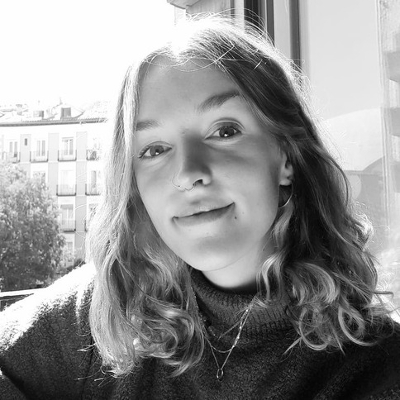This conversation takes us today to Madrid, Spain to speak with Argentine/Spanish writer Clara Obligado, one of the pioneers of writing workshops and microfiction in Spain.
This is an excerpt from a conversation on the podcast Hablemos, escritoras, hosted by Adriana Pacheco.
 Adriana Pacheco: Welcome, Clara.
Adriana Pacheco: Welcome, Clara.
Clara Obligado: Hi, thank you very much for the invitation.
A.P.: So, you are joining us from Spain, right? Where are you? Where do you live, Clara?
C.O.: I have been living in Madrid for about 42 years, I think, or something like that; I’ve been here since ‘76.
A.P.: Tell us a little about your story, how did you get to Spain? Which city in Argentina are you from?
C.O.: I’m from Buenos Aires, part of a family of male writers, national poets, but in a very different way than mine. I come from a very right-wing family, but I am a left-wing person, so in 1976, during the military dictatorship, I had to go into exile in Madrid. Since then, I’ve stayed here, with a lot of contact with Buenos Aires, because I go back and forth, but well, I even have a Spanish grandson now, that is, two generations later.
A.P.: This is evident in your work, and something you talk about is this midpoint, as a migrant and as an exile; that one writes from a line, from a dash, from a rupture. Tell us about this metaphor of the rupture that you have used in many of your works.
C.O.: Anyone who knows the effect of distance understands that it doesn’t happen overnight, but rather gradually one realizes that they are changing. So, little by little, I built a body of work that I also consider mestizo, which is neither short story nor novel, and is formally situated halfway. From there, I try to represent what the loss of a homeland means; it’s a journey that is thematic on one side but is primarily represented in the structure of the works.
A.P.: In Spain, you founded the first creative writing workshop in 1978.
C.O.: It’s also important to consider the Spain I arrived in. I arrived a year after Franco’s death. At that time, Spain had very few developed aspects, while Argentina was coming from a process of youthful and very modern change. So, to some extent, it was a bad time for me personally, but a good time socially. I lived through the era of “La Movida” in Spain, and there I made my contributions along with many others who arrived during that time.
A.P.: You were a student of Jorge Luis Borges. What was that experience like?
C.O.: Yes, I was a student of Borges, I think it was around 1972/73 when Borges left the public university and entered the Catholic University, where I was studying. They didn’t want to let him in because he was agnostic. So, the students wrote a letter asking for Borges to be made a professor, which also speaks to the university’s inflexibility. Borges gave very unique classes that consisted of him talking about whatever he felt like. There were classes where he spoke in Old English, and we didn’t understand anything. There were wonderful classes, and he was a very curious person, well educated, very generous with his knowledge. I always say that what I learned from Borges was how to read in the margins.
A.P.: In Spain, you are recognized as one of the great masters of microfiction, and in some ways as the introducer of the genre. Would you like to tell us a bit about this?
C.O.: It’s an adventure like all my adventures, which start just because. Because I like them, for no other reason. And now it’s precisely twenty years since the publication of Por favor, sea breve, which was the book that brought microfiction to Spain. In it, I set myself two challenges: one was to have a text from every part of Latin America, making microfiction a bridge, not nationally but built by all Spanish speakers. The second challenge I set for myself was to have half of the contributors be women, which, twenty years ago, caused me quite a few problems. From there, I began working with this genre that essentially negotiates with silence, with the precise word.
A.P.: You write and write a lot, you write short stories, you write novels, and once you said that the short story is a great passion, while the novel is a tedious marriage.
C.O.: Yes, the novel is a bit like a stonemason’s work; in the novel, you lay out the plans for the house and from there, you must finish it. Meanwhile, a short story always has something magical about it. It’s not because the genre is easy—it’s particularly difficult—but it does have an element of leaping, juggling, light, which I think is much harder to sustain in a novel.
A.P.: How do you choose to write in one genre or the other? What themes invite you to one or the other?
C.O.: I think I have now found this way of telling stories that is a mix of short story and novel, and I’m comfortable with it. On the one hand, I have character development, more typical of novels, and on the other hand, the precision of a short story. I worked on this in my last three books. This idea consists of giving back to the short story what the novel claims as its own; for example, complex plots and deeper character development. I even have a book of short stories that is a detective novel, meaning each story contains a clue. I’m searching for this middle path. Honestly, genres don’t interest me much. To read them, yes, but not to write them; they bore me a bit.
A.P.: You have worked extensively in creative writing workshops; you have the wonderful Clara Obligado Creative Writing Workshop, and it has lasted many years. When did you found this workshop and what is the philosophy behind it?
C.O.: I’m fortunate to be outside of academia, it’s a gift; if you’re in academia, you’ll understand. I no longer have any bureaucracy, no prerequisite programs, no problems added to my own literary enthusiasm. I gave my first workshop when my daughter was a baby, and now I have one with her.
A.P.: Well, let’s go to some of your books. There’s a novel, La hija de Marx, which was published by Lumen in 1996. With it, you won the Lumen Women’s Prize, that very year. That was your first award, and this is, so to speak, your first novel.
C.O.: It’s my first novel, and I wrote it while I was teaching a course on erotic literature. Suddenly, I realized I was writing about Russian exiles and what happened to women after the Russian Revolution. I was also, in a way, writing about my own generation, about what happened to the women who lived through the political movements in Latin America during those years. It’s a novel that mixes a lot, like all my novels, and spans from the time of Marx to just before World War I. It blends humor with horror in equal measure.
A.P.: Wonderful. Let’s talk about a previous book, El libro de los viajes equivocados, whose title I really like. It was also published by Páginas de Espuma, but in 2011. It’s a moving book because it also made me rethink and reflect on the meaning of exile and something you call the wounded memory. And you say in it, “one does not forget a smell as one does not forget a touch, nor does one forget the last vision of things, and this wounded memory stars for years in the migrant’s dreams.” Recently, we were talking with Rosa Montero about the fragility of memory, even its nonexistence, and something I thought about is this definite existence of sensory memory, or how it sometimes does not exist because we are remaking our memory. What is memory for you?
C.O.: For me, the theme of memory is a central one, but I approach it from a different angle than Rosa Montero. I think a lot about memory as a social commitment. I think of memory as a way to avoid repeating things, in the Argentine sense of “never again.” So, I believe that memory is also what builds justice, that without memory there can be no justice. This is quite strongly presented in El libro de los viajes equivocados. On the other hand, there is also the aspect of losing something on an individual level, and how that memory is dynamic. Perhaps the only feeling, the only thing we can control, is the past, and we change it every day, we invent stories, and this helps us to live.
A.P.: What is your relationship with reading?
C.O.: Well, I’m an addict; I read a lot. Moreover, if I like an author, I read their complete works; not just their complete works, but everything they recommend; not just everything they recommend, but all their influences; not just all those influences, but everything related to them. Not only that, but I teach workshops all day, my students notice it. For example, Alice Munro was one of my latest obsessions. I can’t stop until I understand what she does. When I understand what she does, I let it go.
A.P.: I would like to now discuss La biblioteca de agua, one of your recent works, also published by Páginas de Espuma in 2019. Here you are already explaining the entire narrative experiment that begins with El libro de los viajes equivocados then continues with La muerte juega a los dados and ends with this book as a kind of trilogy. The idea of the saga interests me. What would you say arouses and should arouse literary perplexity when a reader approaches a book?
C.O.: If a book doesn’t startle me at some point, I’m not interested. By startle, I don’t mean Stephen King frightening me, but if there isn’t an adjective placed somewhere or something said that I hadn’t heard before, or some play that surprises me, I’m not fully interested in what’s been written in some way; it doesn’t interest me. So when I write, I do the same. I always say that I write to change literature. Does this book change literature? Later, it turns out not to be true because one doesn’t change literature—it’s a very naive thought. But indeed, to undertake a work with that enthusiasm, what you want to demonstrate is that the order of factors does alter the product. The idea that a city is traversed from the past and from the present upwards and downwards.
A.P.: How wonderful. I invite everyone to explore the work of Clara Obligado. Thank you very much, Clara, for taking the time to talk with us today.
C.O.: Thank you very much to you, Adriana, for your interest in my work.
Translated by Alice Banks
You can listen and read the complete interview in Spanish
on the Hablemos, escritoras website.



